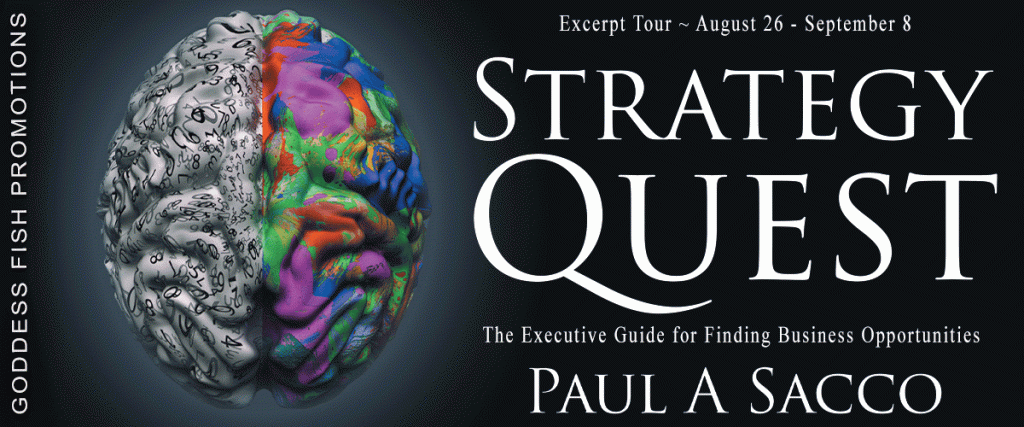This post is part of a virtual book tour organized by Goddess Fish Promotions. Paul Sacco will be awarding a $10 Amazon or B/N GC to a randomly drawn winner via rafflecopter during the tour. In addition, the publishers are supplying this book, as well as others, FREE, here. Click on the tour banner to see the other stops on the tour.
In Strategy Quest: The Executive Guide for Finding Business Opportunities, you will learn how to achieve the strategic mindset necessary to create and decide on the business opportunities that will put you ahead of your competition.
Using the psychology of personality type, you will understand how to make the shift to this growth mindset. In Strategy Quest, you will learn that the strategic mindset is composed of Strategic Intuition and Strategic Thinking. Strategic Intuition creates strategic visions and concepts, while strategic thinking decides if these are genuinely strategic and the right choice for your business.
Strategy Quest uses business examples to show what the strategic mindset is and isn’t. The book also equips you with the tools that you will need for your Strategy Quest and shows you how to overcome the obstacle that you might encounter.
Enjoy an Exclusive Excerpt
People often use the words goal and objective interchangeably; yet, when it comes to finding strategic opportunities, it is very helpful to distinguish between the two. Objectives are usually SMART (Specific, Measurable, Attainable, Relevant, and Time-based). Goals are vague and qualitative and thus, allow for the divergent exploration of information and experiences. Divergent exploration is necessary for you to employ your introverted strategic intuition (NiS). Business objectives are convergent and rely on the deployment of Te or Ti.
Establishing Needs-Based Goals
Although a goal is vague, it can’t be so abstract that it fails to provide a starting point for exploration. Creating a strategic goal requires finding the right level of constraints, such that it is neither too vague nor too specific. A goal stated as, “finding an opportunity to gain ground or distance on competitors” is too vague to start you on your Vision Quest. A goal such as “improve our customer service” is too narrow to be strategic because it references a business function. An effective goal is constrained to the minimum extent possible while still providing direction.
Suppose that I gave you an empty canvas and asked you to paint. You will likely ask, “What do you want me to paint?” Your goal is too vague to know how to start. If I asked you to paint a car, I have constrained your choice of subject. If I asked you to paint something representing the abstract word transportation, your choice of subject is much broader. An effective goal contains an abstract need.
Abstract words are intangible. Consider that the word love is both an abstract word and a need. Although we can’t see it or measure it, we recognize it symbolically; for example, with a heart. Giving someone a gift is an action that can demonstrate love. When we feel love emotionally, we might express our feelings with a hug, for example. There are many different scenes you could paint if your subject is love.
To show how an abstract, needs-based goal can broaden our thinking about a problem, consider someone who has had their house broken into by a burglar who picked the front door lock. A tactical-thinking type would likely see the lock as his tangible problem and conclude that a better one was required. However, if he viewed the problem in terms of an abstract need, he might consider the goal of improving security. Since “security” is an abstract word, he can consider a broader range of information. Rather than simply researching locks, the person might also consider installing a security system, getting a dog, or moving to a better neighborhood.
About the Author As President of Propheta Lucro Management Consultants, Paul specializes in helping leaders find strategic opportunities. One of the world’s top experts in strategic thinking, Paul has over 35 years of experience managing and leading businesses. He is a graduate of the University of Toronto holding both a B.A. Sc. in Chemical Engineering and an MBA from the Rotman School of Management. Paul is available to speak about business strategy or to teach, coach or facilitate the Strategy Quest method. For more information visit our web-site or contact Paul at: Email: Paul@prophetalucro.com
As President of Propheta Lucro Management Consultants, Paul specializes in helping leaders find strategic opportunities. One of the world’s top experts in strategic thinking, Paul has over 35 years of experience managing and leading businesses. He is a graduate of the University of Toronto holding both a B.A. Sc. in Chemical Engineering and an MBA from the Rotman School of Management. Paul is available to speak about business strategy or to teach, coach or facilitate the Strategy Quest method. For more information visit our web-site or contact Paul at: Email: Paul@prophetalucro.com

























Thanks for hosting!
Sounds like a great book.
Thanks, Sherry! I started from scratch with strategy and then build it up again from a psychological perspective. However, it is an easy read.
Thanks for hosting my book!